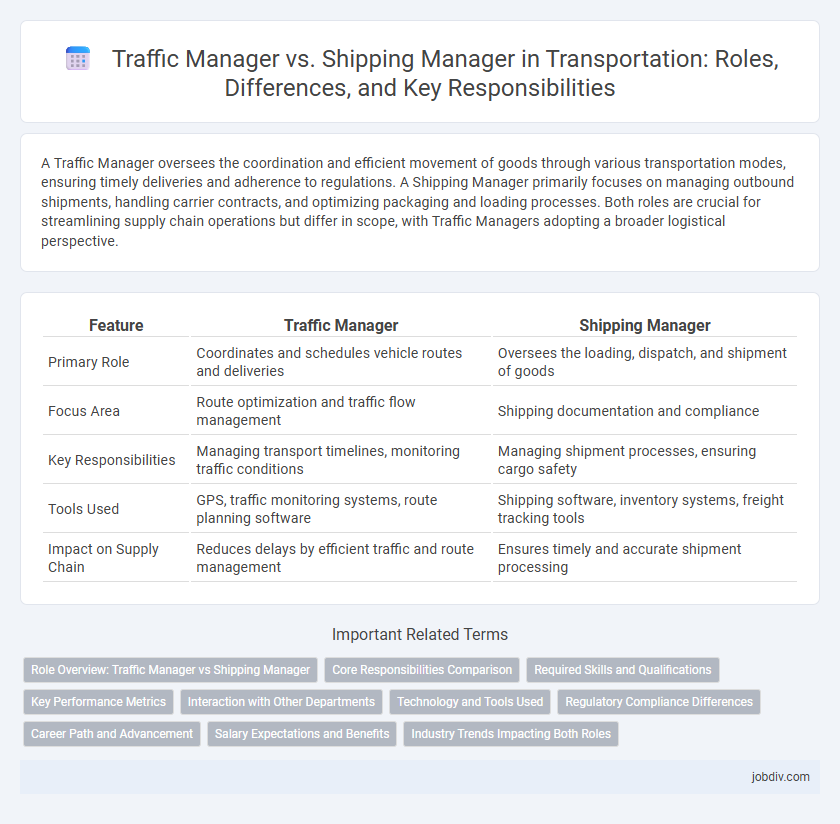A Traffic Manager oversees the coordination and efficient movement of goods through various transportation modes, ensuring timely deliveries and adherence to regulations. A Shipping Manager primarily focuses on managing outbound shipments, handling carrier contracts, and optimizing packaging and loading processes. Both roles are crucial for streamlining supply chain operations but differ in scope, with Traffic Managers adopting a broader logistical perspective.
Table of Comparison
| Feature | Traffic Manager | Shipping Manager |
|---|---|---|
| Primary Role | Coordinates and schedules vehicle routes and deliveries | Oversees the loading, dispatch, and shipment of goods |
| Focus Area | Route optimization and traffic flow management | Shipping documentation and compliance |
| Key Responsibilities | Managing transport timelines, monitoring traffic conditions | Managing shipment processes, ensuring cargo safety |
| Tools Used | GPS, traffic monitoring systems, route planning software | Shipping software, inventory systems, freight tracking tools |
| Impact on Supply Chain | Reduces delays by efficient traffic and route management | Ensures timely and accurate shipment processing |
Role Overview: Traffic Manager vs Shipping Manager
A Traffic Manager coordinates the movement of goods, optimizing routes and schedules to ensure timely delivery across multiple transportation modes, while managing compliance with regulations and overseeing carrier performance. A Shipping Manager focuses on the operational aspects of dispatching shipments, handling packaging, labeling, and documentation, and supervising warehouse staff to maintain efficient loading and unloading processes. Both roles require strong logistics knowledge, but the Traffic Manager emphasizes strategic planning and traffic flow, whereas the Shipping Manager prioritizes execution and shipment accuracy.
Core Responsibilities Comparison
A Traffic Manager oversees the efficient movement of goods within transportation networks, focusing on route planning, carrier coordination, and regulatory compliance to minimize delays and costs. A Shipping Manager primarily handles the dispatch of shipments, managing packaging, documentation, and carrier selection to ensure timely delivery and accuracy. Both roles require logistics expertise but differ in scope, with Traffic Managers emphasizing overall transportation flow and Shipping Managers concentrating on outbound shipment execution.
Required Skills and Qualifications
Traffic Managers require expertise in logistics coordination, route optimization, and traffic flow analysis, often holding certifications like Certified Transportation Professional (CTP). Shipping Managers must possess skills in inventory management, carrier selection, and compliance with shipping regulations, typically requiring experience with supply chain software and knowledge of international trade policies. Both roles demand strong communication abilities and proficiency in transportation management systems (TMS).
Key Performance Metrics
Traffic Managers primarily track on-time delivery rates, route efficiency, and load optimization to minimize transit time and costs. Shipping Managers focus on shipment accuracy, packaging integrity, and compliance with regulatory standards to ensure product safety and customer satisfaction. Both roles rely on key metrics such as freight cost per unit, shipment volume, and carrier performance to drive operational excellence.
Interaction with Other Departments
Traffic Managers coordinate closely with warehouse and distribution teams to optimize shipment schedules and ensure timely delivery, often collaborating with customer service to resolve routing issues. Shipping Managers work primarily with procurement and inventory departments, focusing on packaging, labeling, and compliance to streamline outbound logistics processes. Both roles require effective communication with sales and finance to align transportation costs and delivery expectations with overall business objectives.
Technology and Tools Used
Traffic Managers leverage advanced transportation management systems (TMS) and real-time GPS tracking to optimize routing and ensure timely deliveries. Shipping Managers utilize warehouse management software (WMS) and automated sorting technologies to streamline packaging, labeling, and shipment dispatch processes. Both roles increasingly rely on data analytics platforms and IoT devices to monitor efficiency and reduce operational costs.
Regulatory Compliance Differences
Traffic Managers primarily ensure compliance with local, state, and federal transportation regulations such as the FMCSA and DOT standards, managing vehicle safety, driver qualifications, and route restrictions. Shipping Managers focus on regulatory adherence concerning cargo handling, hazardous materials shipping protocols, export-import laws, and customs documentation under agencies like the CBP and OSHA. Both roles require detailed knowledge of transportation laws but differ in scope, with Traffic Managers emphasizing operational compliance and Shipping Managers specializing in shipment-specific regulations.
Career Path and Advancement
Traffic Managers oversee the coordination and routing of transportation, focusing on optimizing shipment schedules and managing logistics teams to ensure timely delivery. Shipping Managers specialize in supervising the physical shipment process, including packaging, loading, and compliance with shipping regulations, often advancing toward senior operations or warehouse management roles. Career progression for Traffic Managers typically leads to logistics director positions, while Shipping Managers may advance into supply chain management or distribution center leadership.
Salary Expectations and Benefits
Traffic Managers typically earn an average salary ranging from $65,000 to $90,000 annually, while Shipping Managers command slightly higher wages, often between $70,000 and $95,000, depending on experience and location. Benefits for both roles frequently include health insurance, retirement plans, and paid time off, with Shipping Managers sometimes receiving additional bonuses tied to performance metrics. The salary gap reflects the broader scope of responsibilities in shipping management, including inventory oversight and vendor negotiations, compared to the more operational focus of traffic management.
Industry Trends Impacting Both Roles
Traffic Managers and Shipping Managers both face evolving industry trends such as increased automation, integration of IoT technologies, and heightened emphasis on sustainability. The rise of real-time data analytics drives efficiency in route planning and shipment tracking, significantly impacting decision-making processes. Regulatory changes and the shift towards green logistics demand adaptive strategies to optimize transportation networks and reduce carbon footprints.
Traffic Manager vs Shipping Manager Infographic

 jobdiv.com
jobdiv.com